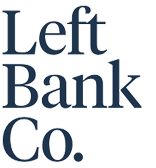Meet the Thinker - Dr Rhian Scott
Dr Rhian Scott
“In Left Bank Co’s inaugural Meet the Thinker, we’re speaking with Dr Rhian Scott. ”
Rhian is a human geographer and postdoctoral research fellow based at King's College in London where she conducts research into the challenges and opportunities of affordable creative infrastructure provision in cities. For those of you who know Left Bank Co well, you will know these are issues close to our heart!
In this article you will read about:
How Rhian came to be interested in structural issues of workspace affordability and why this matters for the creative economy
Defining key terms such as ‘long term’ and ‘affordability’ for creative workspace and how these definitions play a part in policy, planning and development feasibility
What can we learn from international collaboration with cities like San Francisco and Sydney.
Throughout your esteemed academic career, what drove you to focus specifically on the issue of affordable workspace?
This was a slow evolution. It started with an interest in what happens within an individual artist’s studio. As someone who is not an artist, I wanted to understand how these spaces supported the creative process, how they are inhabited by an artist.
I started by looking at a studio complex in St Ives in Cornwall and quickly realised that artists in that setting had luxuries that urban artists don’t, as space is at a premium in cities, especially London. This led to the broader consideration of the impact of property prices on access to workspace and how having less - or more - intermitted access to a studio could impact the very practice of an artist.
As a result of this precarity of access, creative and artistic output has changed: it takes longer, relies on preparation outside the studio environment and thus focuses studio time on production rather than experimentation or design. I became interested in the aggregated impacts of this shift on the city and how artists –writ large [s1] – impact the way the city is lived.
What is the focus of your current research?
A lot of work to date has been to try and quantify affordable creative workspace as an intrinsic good. There is data that shows that it positively impacts vacancy rates and property values but definitions in this field are still very slippery, and that’s where my research comes in. I’m exploring the different strategies that are used to define and deliver affordable creative workspace.
For example, what do we mean by ‘long-term’ when it comes to creative space use? Is it 10 years? Is it 50 years? or is it 999 years as the Creative Land Trust has recently secured? We can’t get long-term outcomes for the sector if we’re all defining critical terms like these differently.
Another one is affordability. Currently, affordable rents are defined against other studios’ rents. But they offer different things, making like for like comparison difficult. We’ve got a point a few years ago where 11 GBP per sqf (per annum) was the benchmark, but this has been going up.
So do you shift it over time? Or reclassify space as no longer affordable? Or do you define as a proportion of market rents? A lot of questions which need to be answered to help embed affordability into creative workspace developments.
What is the point of international cooperation on this? What can international cities learn from London and vice versa?
The crisis of urban affordability is global. Some cities like San Francisco, Sydney, Berlin and New York are experiencing this in a very acute way. International knowledge sharing and cooperation is about showcasing innovation in how to tackle unaffordability but also help cities leapfrog and avoid mistakes.
Whilst models need to be sensitive to their context, there is much to learn from other cities that can help head in the right direction. This is particularly important as the world prepares to consider the post-Covid city. We don’t have formal data on the impact of the pandemic of artists’ earning yet, but this will no doubt impact affordability of workspace.
Shaping a local agenda:
The international cooperation and knowledge sharing cannot start soon enough. Australian cities are facing similar challenges and would benefit from the localisation of the definitions and value capture frameworks that Rhian has been working on. Priorities include:
Creating a clear set of definitions that can help embed key terms into planning and legal agreements and avoid confusion.
Articulating a clear value framework that can help build the tangible and untangible value created by creative communities into project feasibilities
Defining affordability in relation to property prices and creatives’ living wages in a way that can evolve as circumstances evolve
Capturing and understanding the impacts of the Covid-19 pandemic of the supply and accessibility of creative workspace in our urban centres.
We look forward to working with our colleagues, partners and clients to further these important set of issues in Australia and internationally!
For more information on Dr Rhian Scott’s work, please visit: https://www.kcl.ac.uk/people/rhian-scott

